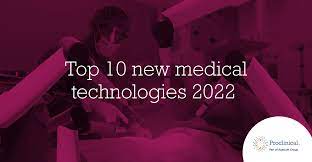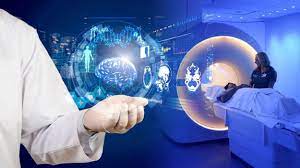
Advancing Healthcare Through Cutting-Edge Medical Technology
The Impact of Medical Technology on Healthcare
Medical technology has revolutionized the field of healthcare, transforming the way diseases are diagnosed, treated, and managed. From advanced imaging techniques to cutting-edge surgical procedures, technological advancements have significantly improved patient outcomes and quality of care.
One of the most notable contributions of medical technology is in the field of diagnostics. Imaging technologies such as MRI, CT scans, and ultrasound have enabled healthcare providers to visualize internal organs and tissues with unprecedented clarity, allowing for early detection of diseases and more accurate diagnoses.
In addition to diagnostics, medical technology has also played a crucial role in treatment modalities. Robotic-assisted surgeries have made complex procedures more precise and less invasive, leading to faster recovery times and reduced complications for patients. Furthermore, advancements in pharmaceuticals and biotechnology have resulted in the development of targeted therapies that are tailored to individual patients based on their genetic makeup.
Telemedicine is another area where medical technology has had a significant impact. With the advent of telehealth platforms and remote monitoring devices, patients can now consult with healthcare providers from the comfort of their homes. This not only improves access to care for individuals in remote areas but also reduces unnecessary hospital visits, saving time and resources for both patients and healthcare facilities.
Looking ahead, the future of medical technology holds even more promise. Innovations such as artificial intelligence (AI) and machine learning are being integrated into various aspects of healthcare, from predicting disease outbreaks to personalizing treatment plans. Wearable devices that track vital signs and health metrics in real-time are empowering individuals to take control of their own health and well-being.
While medical technology continues to advance at a rapid pace, it is essential for healthcare professionals to stay abreast of these developments and adapt their practices accordingly. By embracing new technologies and incorporating them into clinical workflows, healthcare providers can deliver more efficient, effective, and patient-centered care.
In conclusion, medical technology has had a profound impact on the field of healthcare, revolutionizing how diseases are diagnosed, treated, and managed. As we continue to witness rapid advancements in this field, it is crucial for healthcare professionals to leverage these technologies to improve patient outcomes and enhance the overall quality of care.
8 Key Benefits of Advancements in Medical Technology
- Improved diagnostic accuracy
- Enhanced treatment effectiveness
- Minimally invasive surgical procedures
- Faster recovery times for patients
- Personalized medicine based on genetic profiles
- Remote monitoring for better management of chronic conditions
- Increased access to healthcare through telemedicine
- Integration of artificial intelligence for more efficient healthcare delivery
Challenges of Medical Technology: High Costs, Privacy Issues, Tech Dependency, and Accessibility Gaps
Improved diagnostic accuracy
Improved diagnostic accuracy is a significant pro of medical technology that has revolutionized healthcare. Advanced imaging techniques and diagnostic tools have enabled healthcare providers to identify diseases and conditions with greater precision and efficiency. This enhanced accuracy not only leads to earlier detection of illnesses but also allows for more targeted and effective treatment plans. By leveraging cutting-edge technologies, healthcare professionals can provide patients with timely diagnoses, leading to improved outcomes and better overall patient care.
Enhanced treatment effectiveness
Medical technology has significantly enhanced treatment effectiveness by providing healthcare providers with innovative tools and techniques to deliver more targeted and personalized care to patients. Advanced treatment modalities, such as robotic-assisted surgeries and precision medicine, have revolutionized the way diseases are treated, leading to better outcomes and improved patient satisfaction. By leveraging cutting-edge technologies, healthcare professionals can tailor treatment plans to individual patients’ needs, resulting in more precise interventions and higher success rates. The enhanced treatment effectiveness brought about by medical technology not only improves patient outcomes but also contributes to overall advancements in healthcare delivery and quality of care.
Minimally invasive surgical procedures
Minimally invasive surgical procedures represent a significant advancement in medical technology, offering patients numerous benefits compared to traditional open surgeries. By utilizing small incisions and specialized instruments, these procedures result in reduced trauma to the body, less postoperative pain, shorter recovery times, and lower risk of complications. Patients undergoing minimally invasive surgeries often experience faster healing and can return to their daily activities sooner, leading to improved overall outcomes and patient satisfaction. The precision and effectiveness of these procedures make them a preferred choice for many patients and healthcare providers seeking optimal results with minimal invasiveness.
Faster recovery times for patients
Medical technology has significantly contributed to faster recovery times for patients by enabling more precise and minimally invasive procedures. Advanced surgical techniques, robotic-assisted surgeries, and innovative pharmaceuticals have all played a role in reducing the recovery period for patients undergoing treatment. By leveraging cutting-edge medical technologies, healthcare providers can optimize patient care, enhance post-operative outcomes, and ultimately shorten the time it takes for individuals to regain their health and well-being.
Personalized medicine based on genetic profiles
Personalized medicine based on genetic profiles is a groundbreaking advancement in medical technology that holds immense promise for improving patient outcomes. By analyzing an individual’s genetic makeup, healthcare providers can tailor treatment plans to suit their specific needs, increasing the effectiveness of therapies while minimizing potential side effects. This approach allows for a more precise and targeted approach to healthcare, shifting the focus from a one-size-fits-all model to one that is uniquely tailored to each patient’s genetic predispositions. Ultimately, personalized medicine based on genetic profiles has the potential to revolutionize the way diseases are treated, leading to better outcomes and improved quality of life for patients.
Remote monitoring for better management of chronic conditions
Remote monitoring through medical technology has emerged as a game-changer in the management of chronic conditions. By enabling healthcare providers to remotely track patients’ vital signs, symptoms, and medication adherence in real-time, remote monitoring allows for proactive intervention and personalized care plans. This proactive approach not only improves patient outcomes by detecting potential issues early but also enhances patient engagement and satisfaction by providing continuous support and guidance outside traditional healthcare settings. Ultimately, remote monitoring empowers individuals with chronic conditions to take an active role in managing their health while receiving timely interventions from their healthcare team, leading to better overall disease management and quality of life.
Increased access to healthcare through telemedicine
The advent of telemedicine has significantly increased access to healthcare services, especially for individuals in remote or underserved areas. Through telehealth platforms, patients can now consult with healthcare providers remotely, eliminating the need for travel and reducing barriers to accessing medical care. This technological advancement has not only improved convenience for patients but has also enhanced healthcare delivery efficiency, leading to timelier consultations and interventions. Overall, telemedicine has proven to be a valuable tool in expanding access to quality healthcare services and promoting better health outcomes for individuals across diverse geographical locations.
Integration of artificial intelligence for more efficient healthcare delivery
The integration of artificial intelligence (AI) into healthcare delivery has significantly enhanced efficiency and accuracy in medical practices. AI-powered systems can analyze vast amounts of data quickly, identifying patterns and insights that might be missed by human eyes. This capability allows for faster diagnosis and personalized treatment plans, improving patient outcomes. Additionally, AI can streamline administrative tasks such as scheduling, billing, and managing electronic health records, freeing up healthcare professionals to focus more on patient care. By reducing the time spent on routine tasks and enhancing diagnostic precision, AI is revolutionizing the way healthcare is delivered, making it more efficient and effective for both providers and patients.
1. Costly
One significant drawback of medical technology advancements is their high cost implications. The development, implementation, and maintenance of cutting-edge medical technologies can be financially burdensome, resulting in increased healthcare costs for both patients and healthcare systems. As these technologies become more sophisticated and specialized, the expenses associated with acquiring and utilizing them continue to rise, posing challenges for individuals seeking affordable healthcare services and straining the resources of healthcare providers and institutions. The costliness of medical technology can create disparities in access to innovative treatments and services, ultimately impacting the overall affordability and sustainability of healthcare systems.
2. Privacy concerns
The widespread adoption of medical technology, including electronic health records and wearable devices, has raised significant privacy concerns regarding the security and confidentiality of patient information. As healthcare data becomes increasingly digitized and interconnected, the risk of unauthorized access, data breaches, and misuse of personal health information also escalates. Patients may feel apprehensive about the potential exposure of their sensitive medical data to third parties, leading to concerns about privacy violations and identity theft. Safeguarding patient confidentiality in the digital age poses a complex challenge that necessitates robust cybersecurity measures and stringent regulations to protect individuals’ privacy rights in the realm of medical technology.
3. Dependency on technology
One significant con of medical technology is the risk of healthcare professionals becoming excessively dependent on these tools, leading to a potential erosion of critical thinking skills and clinical judgment. Relying too heavily on technology may result in practitioners overlooking crucial aspects of patient care that cannot be solely addressed by machines or devices. It is essential for healthcare professionals to strike a balance between utilizing medical technology as a valuable resource and maintaining their ability to think critically, make informed decisions, and provide personalized care based on their expertise and experience.
4. Accessibility disparities
Accessibility disparaties in medical technology present a significant challenge in the healthcare landscape. The unequal distribution of advanced medical technologies means that individuals with lower socioeconomic status or those residing in remote areas may not have the same access to cutting-edge treatments and diagnostic tools as their more privileged counterparts. This disparity can result in unequal healthcare outcomes, with marginalized communities facing barriers to receiving timely and effective care. Addressing these accessibility gaps is crucial to ensuring that all individuals have equitable access to the benefits of medical technology and can receive the quality healthcare they deserve.



